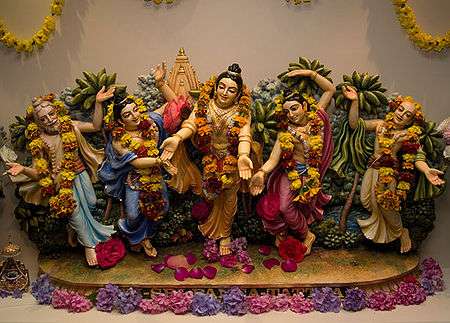Pancha Tattva (Vaishnavism)

Pancha Tattva (Devanagari: पञ्चतत्त्व; IAST: pañca-tattva, from Sanskrit pañca meaning "five" and tattva "truth" or "reality") in the Gaudiya Vaishnava or Krishnaist tradition refers specifically to the Five aspects of God or Absolute Truth.
Background
In Gaudiya Vaishnavism or Gaudiya Krishnaism these five features of God (Krishna) are believed to have incarnated on Earth as five people in the late 15th century, Chaitanya Mahaprabhu, Nityananda Prabhu, Advaita Acharya, Gadadhara Pandita and Srivasa Thakura. They famously spread the Hare Krishna mantra, and the practice of devotion (bhakti) to Krishna throughout India.
The Five Features
- Chaitanya Mahaprabhu is Krishna Himself, The Supreme Person (Svayam Bhagavan).
- Nityananda is Krishna's first personal expansion with a combined power of Balarama
- Advaita Acharya is a combined incarnation of Lord Vishnu & Lord Shiva (Harihara).
- Gadadhara is a combined incarnation of Radha, Lalita (gopi) and Krishna's internal energy.
- Srivasa is Krishna's pure devotee and symbolizes devotion.
"I bow down to Lord Krishna, who appears as a supreme devotee (Lord Chaitanya), as His personal expansion (Sri Nityananda), His incarnation (Sri Advaita), His devotee (Sri Srivasa), and His energy (Sri Gadadhara), and who is the source of strength for the devotees." (Chaitanya Charitamrita Adi 1.14)
Pancha Tattva mantra
Within the Gaudiya tradition a mantra formed from the names of the five members of the Pancha Tattva is often spoken or sung as a means of devotional worship or meditation (japa). Often this mantra is sung or chanted prior to the Hare Krishna mantra. It is believed by followers to be the most merciful mantra available in this age of Kali.
- śrī-kṛṣṇa-caitanya prabhu-nityānanda,
- śrī-advaita gadādhara śrīvāsādi-gaura-bhakta-vṛnda[1]
See also
References
- Rosen, Steven J. Sri Pancha Tattva: The Five Features of God 1994 ISBN 0-9619763-7-3 Folk Books, New York